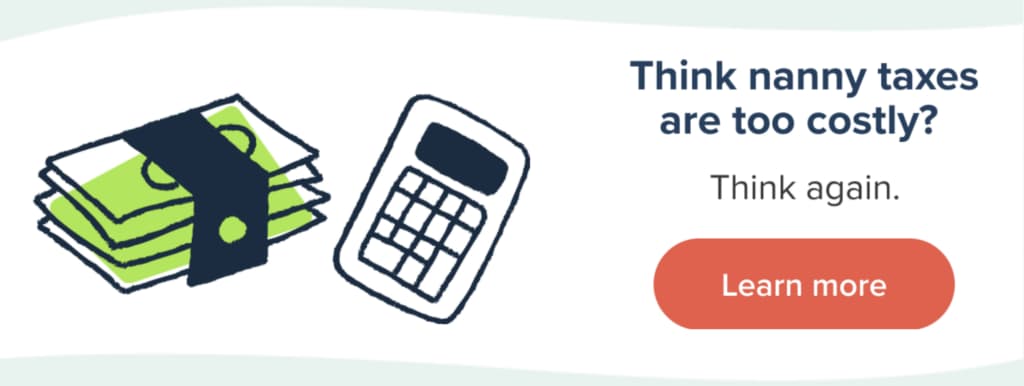When you hire a household employee, such as a nanny, senior caregiver or personal assistant, you have a specific set of tax and payroll responsibilities to follow. Yet some families choose not to abide by these requirements. What they don’t realize is that it’s relatively easy to be caught paying a caregiver under the table — and the consequences can be damaging.
“There are actually several very common scenarios where the IRS or a tax agency in your state can be made aware of your failure to pay household employment taxes,” says Tom Breedlove, Sr. Director of Care HomePay. “And given that several public figures over the past couple of years have had political nominations derailed by household employment issues, you could argue that this topic is in the spotlight more than ever.”
If you do get caught, you’ll have to file late tax returns to state tax agencies and amend your personal income tax return — which can be a months-long process. You’ll also have to pay the back taxes you owe, along with any penalties and interest added by the state and the IRS, which can be several thousand dollars.
So before you decide whether to pay your caregiver legally or risk paying off the books, consider these four common situations.
Scenario #1: Your caregiver files for unemployment benefits
Most people are familiar with the process of filing for unemployment benefits if they’re let go from their job. However, there a far fewer who understand what happens after the initial claim is filed. If you have to let your caregiver go and they file for unemployment benefits, the state will investigate your caregiver’s claim. Part of that investigation is pulling up your record as an employer, which is identified through a unique tax identification number on record — assuming you have one.
If you’re paying your caregiver under the table, the state won’t have record of you as a registered employer, meaning they’ll know right away that you haven’t been paying unemployment insurance taxes. This will most likely trigger an audit of your tax returns to confirm how much in state unemployment insurance taxes you’ve failed to send in. The IRS will also likely get involved as your tax payments to the state include a small portion that is supposed to fund the federal unemployment insurance tax pool. Until these issues are resolved, your caregiver will also be ineligible to receive unemployment benefits because you haven’t contributed to the benefits pool.
Scenario #2: Your caregiver files a wage dispute with the Department of Labor or the state
If your caregiver feels they have been paid incorrectly, they may turn to the state or the Department of Labor for help. Disputes over pay can originate from several different issues, including:
Discrepancies over the hours your caregiver works.
Failing to pay overtime if your caregiver worked more than 40 hours in a week.
Not paying for agreed upon sick time or vacation days.
Being misclassified as an independent contractor instead of an employee.
“Whether your caregiver’s assessment of their pay is accurate or inaccurate is irrelevant as an investigation will be opened once the dispute is filed,” says Breedlove. “And workers can file a wage dispute even a couple of years after they stopped working for you.”
When a case worker begins going over the merits of your caregiver’s complaint, they will want to see documentation to back up the claims being made. With no record of you as an employer, it will be apparent that taxes have not been part of the employment arrangement, especially if there are also no pay stubs to prove otherwise.
Scenario #3: The IRS randomly audits your tax return
According to the IRS, nearly 708,000 tax returns were audited for the 2022 fiscal year (Oct. 2021 – Sept. 2022). That’s not a very high number compared to the number of families who file tax returns, but if you’re one of the people randomly selected for an audit, you don’t want the IRS finding out you employed a caregiver in your home but did not withhold taxes from them or pay taxes as a household employer.
Scenario #4: Your caregiver files their taxes using a replacement W-2 form
Household employees are supposed to receive a W-2 so they can file their personal income tax return. If you pay your caregiver under the table, there is no tax form for them to use to file their taxes. Even if your caregiver is not knowledgeable about how taxes work, they are most likely aware that something needs to be sent to the IRS every year to be compliant with the law.
The IRS has a substitute form for a W-2 called Form 4852 that your caregiver can use to send in the taxes they owe if you have failed to provide them with a W-2. The form specifically asks them for information about their employer (in this case, you), which greatly increases the chance that the IRS will be in contact with you regarding the way you’ve set up employment with your caregiver.
These four scenarios we’ve outlined can happen to just about any family. The risk associated with paying a caregiver under the table simply isn’t worth it when you think about the financial and legal consequences. And this doesn’t take into account missing out on the tax breaks that come with paying legally — or the benefits your caregiver receives when paid on the books.
Next steps:

